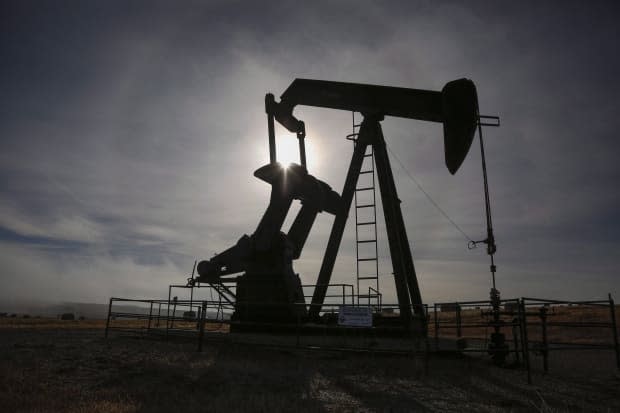OPINION | Albertans asked to have faith in province's pipeline play
When it comes to investing billions of public dollars in private companies, Alberta politicians like to talk about former premier Peter Lougheed.
Nobody likes to talk about former premier Don Getty.
This week, when Premier Jason Kenney defended his government spending $1.5 billion of public cash and $6 billion in loan guarantees to prop up the Keystone XL pipeline project, he pointed to Lougheed successfully investing in private companies in the 1970s.
It's true that Lougheed invested in companies such as Syncrude. Heck, he even bought companies such as (the now defunct) Pacific Western Airlines. But he did it when his government was flush with money thanks to a healthy oil sector. It was all part of Lougheed's plan to use surplus cash to help diversify the province's economy — as well as funnel money into the newly created Alberta Heritage Savings Trust Fund.
Then came a recession, and Don Getty who tried to kick-start the economy and save jobs through loan guarantees and investments in private companies. But more than a few turned into money-losing disasters.
This is not to say Kenney's $7.5-billion gamble on the Keystone project will end in a fiasco for Alberta taxpayers.
But this is a gamble. The price of oil has been hammered thanks to the COVID-19 pandemic driving down demand, and a production war between Saudi Arabia and Russia driving up supply.
Uncharted territory
As Kenney said on Thursday, Western Canadian Select — the price Alberta gets for its heavy oil — is so low, and getting lower by the day, that it could be trading at negative prices later this month. That means our producers would have to pay someone to take the oil off their hands.
As Kenney keeps telling us, we are in uncharted territory.
That's certainly true for Kenney personally.
He's a staunch free-market, free-enterprise conservative who in his own words is "always skeptical of market intervention."
Yet, here he is diving into the market to a potential depth of $7.5 billion. At a time when oil prices might be about to go underwater.

Kenney realizes how this looks — and he addressed the issue head-on in the legislature on Thursday:
"A lot of people may be wondering right now: 'Well, why is the government taking, quote, a bet, on this when prices are at $5 a barrel for Alberta oil?' It's a reasonable question. The answer is that we have to plan for the long-term. It would be a terrible mistake for leaders, at a time such as this, to focus only on the hour-by-hour crisis management. A responsible government must plan for the mid- to long-term, and that's exactly what this investment does."
NDP Leader Rachel Notley, never one to back down from an opportunity to criticize Kenney, is not on the attack this time. That's because she had been in the same boat when she was premier in 2018 and declared she'd be willing to buy the Trans Mountain pipeline to keep its expansion project alive.
NDP supports project
On Thursday, after listening to Kenney speak about the Keystone investment, Notley said bluntly yet tamely, "We support this project."
Oh, she's still pressing Kenney for more details on his estimate that the Keystone investment will mean $30 billion in extra revenue for the province. But as someone who once considered investing $2 billion in a pipeline project, Notley is not in a position to press particularly hard.
She, like the rest of us, will just have to trust that the government has done its homework and calculated the risk.
As NDP MLA David Shepherd declared during debate on Thursday, "We are relying on the good faith of government." He was talking about the health crisis but it's a quote for all seasons. "We must be honest with each other," he added.
But I have to admit that when it comes to government honesty, I can get a little skeptical.
On Monday, for example, when Kenney was asked why his government cut $128 million from the education budget, triggering mass layoffs among educational assistants, he replied: "The layoffs are the result of the advice of our public health officer to close the schools."
Hmm. Well, while Dr. Deena Hinshaw, Alberta's Chief Medical Officer of Health, did recommend ending in-class education, I don't think she suggested laying anybody off.
This demonstrates that when it comes to being straight-forward with Alberta, Kenney can sometimes be as slippery as a government-funded oil pipeline.
Also on Monday, the Alberta government issued a misleading news release about its controversial and gaffe-prone "war room" with the headline: "The Canadian Energy Centre (CEC) is reducing its current operating budget by 90 per cent to reflect needs during the COVID-19 pandemic."
"If applied on an annual basis," said the release, the cut would reduce the centre's budget from $30 million down to $2.84 million. Critics of the war room cheered.
However, the cut is not designed to last a year. It is planned for just "three months or until regular operations can recommence." If funding returns to normal after three months, the war room's budget for the year will still be a hefty $23 million, not $3 million.
As Shepherd said, "we are relying on the good faith of government."
When it comes to the Keystone XL project, that faith comes with a price tag that could reach $7.5 billion.
This column is an opinion. For more information about our commentary section and how you can contribute to the conversation, please read this editor's blog and our FAQ.

